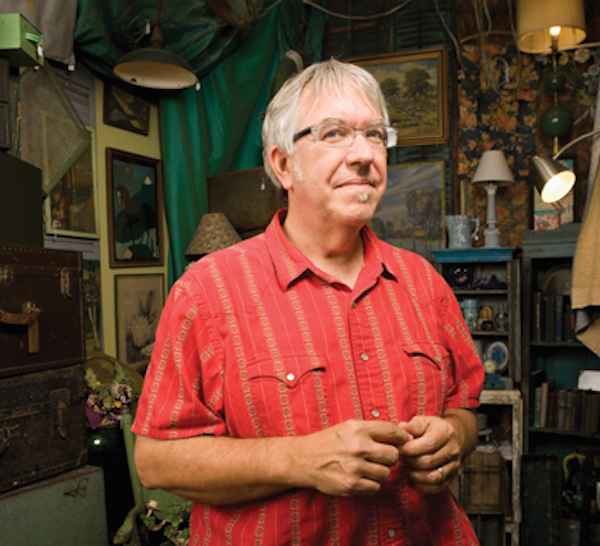When you visit Uncommon Objects on South Congress you can never be sure what you’ll happen upon. The store is a byzantine garage sale on steroids, its merchandise piled high and packed into every nook. During a recent visit, I found cow skulls hung like high art on the wall, aging butcher’s diagrams turned into a free-form sculpture and a Virgin Mary illuminated by a chandelier of cascading sea shells—just to name a few.
There were also people, lots of them. They milled about the store, peering around corners and sifting through the curious remnants of lives past. If customers at Uncommon Objects look like they’re strolling through an interactive museum of sorts, there’s a reason for that.
His name is Steve Wiman and he’s the store’s longtime owner.
“I truly think retail is an art form,” said Wiman, a found-objects artist. “The work I do in my studio influences what we create in the shop and vice versa.”
When I visited him at the store, he showed me one of his latest creations, a long trough full of toys arranged in a rainbow pattern. This particular work was created for Sala Diaz, a nonprofit gallery in San Antonio.
Wiman’s personal work relies on a clever sleight of hand that he replicates in Uncommon Objects. His arrangements draw you in with familiarity until a closer inspection reveals something contradictory, even unsettling. Throughout the store, eye-catching objects are rarely dead center but instead, tucked into displays that entice customers to find them.
“Items from many different eras and sensibilities may be incorporated in a display creating unexpected narratives because of the odd juxtapositions,” he said. “It’s one big, organic, ever changing installation.”
It gives the store a subtle sense of possibility, igniting the customer’s inner treasure hunter. Although Wiman and his staff use much of the space in Uncommon Objects, the store is also home to a handful of independent vendors. Without knowing what sort of objects will show up from one week to the next, Wiman and his visual team rarely plan new displays in advance and, though the presentations may look haphazard, they’re far from it.
“When we put something in a display that doesn’t fit, it will be noticed and confirmed by multiple sets of eyes,” said Wiman, noting that a team of merchandisers comes in several times a week to rearrange the store. “It’s not just putting inventory onto the shelves, but it’s really creating artwork for a living, moving, changing and breathing thing. And I think that’s what people respond to.”
Wiman traces his appreciation for found objects—and his penchant for hoarding them—back to his parents. His father worked as a janitor at a church and his mother’s values were formed during the Depression. He remembers his father keeping objects he found during the week in a bowl on his dresser and his mother impressing upon the family the importance of saving items that could be repurposed later on.
“They placed value in stuff that others would just throw away” he said.
After receiving his MFA from the University of Texas, Wiman continued to hone his eye for unusual objects during a stint in the late 1980s as a décor coordinator for Chili’s restaurants. Beyond teaching him about the junk business, Wiman credits the job it with planting the seeds for Uncommon Objects. The “junk” lying around his studio would later become inventory for his business.
“I ended up in business just by chance,” he said. “I had a good eye, I was able to find things to buy and sell and make a profit.”
Wiman haunted the local City Wide Garage Sale, setting up a booth for his wares. Eventually, he became a partner in Uncommon Objects’ predecessor, a small shop in Austin called Artifacts. The location on South Congress was ideal, with a view that led all the way to the steps of the state capital.
Artifacts was renamed Uncommon Objects in 1991. (Wiman took over sole proprietorship six years ago). The business has grown from a tiny shop with a five-person vendor group to a bustling business with 25 vendors and 11 employees. Over the past 21 years, Wiman has hired a number of staffers from the LGBT community. He has also offered his visual merchandising skills to the silent auction for Holiday Swing, a fundraising event for Project Transitions.
“We are always impressed by the incredible staff and the remarkable group of volunteers who come together to throw one of the best parties of the year,” he said, noting that the Uncommon Objects team has also supported the Human Rights Campaign and the Southern Texas Poverty Law Center over the years. “The work these folks do throughout the year is so important and very inspiring.”
Two decades after he started Uncommon Objects, Wiman said the business is less a job and more of a lifestyle. Even family vacations are subject to the gravitational pull of a junk shop or an antique store. The cycle of hunting for objects, fixing them, cleaning them and then finding ways to make them visually appealing enough to be sold, is unending, but Wiman wouldn’t have it any other way.
“It’s just the way I live,” he said.




































